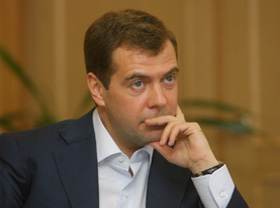
Russian president to court Uzbekistan during state visit - paper
Russian President Dmitriy Medvedev will pay a state visit to Uzbekistan on 22-23 January and hold talks with his colleague, Islam Karimov. The need for the summit, which was initiated in Moscow, arose after Tashkent at the end of last year announced the halting of activity in the Eurasian Economic Community and let it be understood in a number of statements that it is ready for a foreign policy reorientation.
Dmitriy Medvedev noted in his New Year greetings that "for us Uzbekistan is a key strategic partner in Central Asia. We value the cooperation which we conduct in the sphere of security and the ensuring of law and order in this most important region."
However, in fact the situation developed as follows: prospects for cooperation with the West have opened up for Tashkent, and Russia has to resort to political and economic curtseys to Uzbekistan. Medvedev is now going to Karimov with a package of tempting proposals in the field of protecting investments, the oil and gas sector, transport, military-technical cooperation, and migration. In particular Nezavisimaya Gazeta has learned that Moscow is ready to purchase Uzbekistani gas at the unprecedentedly high price proposed by Tashkent of US$326 per 1,000 cubic meters.
"If we lose Uzbekistan then we can forget about Russia’s presence in Central Asia. It will be replaced by a presence in individual states," Aleksey Malashenko, an expert at the Carnegie Moscow Centre, told Nezavisimaya Gazeta. In his opinion, furthermore, the "individual presence" could in the future become purely symbolic, since the probability that other countries in the region will also follow the example of Uzbekistan’s political U-turn is high. "Today Uzbekistan is the attacking side and Russia is the reacting one. Moscow is, therefore, playing by rules proposed by Tashkent, especially since Russia has an economic interest in Uzbekistan in the form of energy resources," Malashenko noted.
Experts consider that in Tashkent the presidents will probably avoid the sharp corners, in particular relations in regional alliances which have for some time been arousing Karimov’s irritation, and will accentuate attention on deepening bilateral cooperation in favourable spheres. For instance, attention will be paid to questions of military-technical cooperation. Uzbekistan acquires Russian weapons within the framework of the Collective Security Treaty Organization, those serving in various Uzbekistani power structures undergo training in Russia, and questions of protecting investments and problems of migration are also of interest to Tashkent.
"Moscow understands that Tashkent has started to prefer bilateral links to multilateral relations in the format of alliances. Russia would like to boost its integrating functions within the framework of regional organizations, while Uzbekistan wants to see these structures in such a form that they would facilitate the strengthening of direct bilateral relations. That is the difference between the positions of Moscow and Tashkent. As a whole, relations with Russia have been, are, and will continue to be a priority for Uzbekistan. However, partnership and alliance must be reinforced with new agreements," Rafik Sayfulin, political scientist, doctor of historical sciences and former adviser to the president of Uzbekistan, told Nezavisimaya Gazeta.
Sources in Tashkent told Nezavisimaya Gazeta that the attention of Western diplomatic missions accredited in Uzbekistan is riveted on Dmitriy Medvedev’s visit. They suppose that the results of the Russian president’s negotiations with Islam Karimov could somehow reflect on the development of American-Uzbekistani relations.
As is known, newly-elected US President Barack Obama intends to accelerate the anti-terrorist campaign in Afghanistan. In order to transfer an extra 20,000 servicemen plus equipment to Afghanistan and to create the necessary infrastructure on the spot, the United States will require a transshipment base and a transit corridor.
As regards the corridor, the Americans - with the attainment of the necessary agreement - will be able to use the Termez-Hairaton railroad, which Uzbekistan finished constructing at the end of last year. The existing NATO base in Termez, where a military grouping from the Federal Republic of Germany is based, is not coping with the extra load, so Washington has started talks with Tashkent on the topic of creating another one. Strengthening the West’s military presence on the territory of a strategic ally could be not in the interests of Russia and it is, therefore, not ruled out that Dmitriy Medvedev will propose his own scenario.